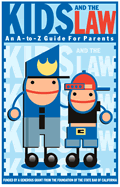

Kids and the Law updated and translatedAre parents liable if they host a party and one of the young guests gets drunk and causes a traffic accident? Do youngsters have to file separate income tax returns? Is it against the law to belong to a street gang? Is it legal for children to operate motorized scooters on city streets? Do online sexual predators pose a threat to children who use computers? Are there any legal restrictions on Web sites that collect personal information from children? The answers to these and many other questions may be found in the revised version of the State Bar’s popular Kids and the Law: An A-to-Z Guide for Parents, included in this issue of the California Bar Journal. Last printed in 2001, Kids and the Law is a comprehensive guide to help parents and their children understand how laws affect them and how they can avoid breaking the law and getting in trouble. Subjects run from drugs and driving to parental responsibility and truancy. “Kids and the Law provides parents with an excellent resource guide to brush up on the laws governing their children,” said Janet Green of Riverside, a public member of the bar’s board of governors. “It serves as a tool for parents to help their children learn about appropriate behavior in different circumstances.”
Kids and the Law was the first guide published as part of the State Bar’s public education series, which is funded partially by a $50,000 grant from the Foundation of the State Bar of California. The second public education guide was When You Become 18: A Survival Guide for Teenagers, which was acquired from the California Law Advocates, and the third was Seniors & the Law: A Guide for Maturing Californians, which was first produced by the bar last year. Each guide is revised and re-released every three years, all with support from the bar foundation. “Our support is possible because of the generous contributions of California lawyers and the foundation’s corporate sponsors,” said Herb Rosenthal, president of the foundation. “We encourage you, California lawyers and bar association volunteers, to share this guide with your families and your communities.” “Kids and the Law is one of our most successful programs in providing valuable legal information to the public,” said State Bar Executive Director Judy Johnson, calling the guide “the cornerstone of the State Bar’s public education program” — a program that also includes a series of 20 popular consumer information pamphlets. In addition, some of the bar’s consumer publications are available in Spanish, Chinese, Korean, Vietnamese and Tagalog, as well as English. “We hope lawyers who are parents and are receiving Kids and the Law in this Bar Journal will share this vital information with their kids, their grandkids, all the kids in their lives,” said Johnson. “And we hope lawyers who don’t happen to be parents will share it with teachers, friends who are parents and anyone else who can help pass on this information.” First published in 1996 in print form, the publication offers relevant, accessible, easy-to-understand information on a wide range of laws and legal issues involving children in California. Kids and the Law was triggered in the mid-1990s after a State Bar survey revealed that many children were unclear about certain laws and the consequences for breaking them. The survey suggested that while most children in their adolescent and teen years would turn to their parents with legal questions, they actually learned more about the law from school and television. Some of the questions answered in the booklet include: Alcohol — What happens when a teenager is arrested for driving under the influence of alcohol? Can a teenager lose his or her driver’s license if caught drinking alcohol — even if he or she is nowhere near a car? Curfew — Does state law or local ordinance set the curfew for minors? Do curfew laws have any exceptions? Can parents be required to pay the cost of transporting their child home after a curfew violation? Drugs — What are the laws regarding drug use by minors? Are the consequences more serious if a child is caught with drugs at school? Parents’ Responsibilities — Can parents legally stop supporting a problem child by simply kicking him or her out of the home? Could parents be held liable if their child commits an Internet-related crime, such as software piracy, without their knowledge? Police — When do police have the right to search a child or adult without his or her consent — and, if so, what are the limits to such searches? What should a youngster do if stopped by police? Privacy — What is the 1998 Children’s Online Privacy Protection Act? What kinds of medical treatment can a child of 12 or older seek without his or her parents’ knowledge? Guns — If a parent gives a gun to a minor or leaves a gun where the child could get it and someone winds up injured or killed as a result, how much is a parent liable for? Is it illegal to brandish a fake gun? The bar has printed 1.2 million copies of Kids and the Law: 800,000 in English, 300,000 in Spanish and 100,000 in Chinese. Additional translations may become available later in the year. The guide is free on a first-come, first-served basis. Orders should be e-mailed to kids@calbar.ca.gov. Please specify the number of guides and language versions desired, and include a complete mailing address (P.O. boxes are not acceptable). If you do not have access to e-mail, please send your order to Kids and the Law, State Bar of California, attn: Melinda Soria, 180 Howard St., San Francisco, CA 94105-1639. While all orders are free, contributions are always welcome and will help support the public education program. Checks should be made payable to the State Bar of California and sent to the address above. |
||||||||
|
||||||||
